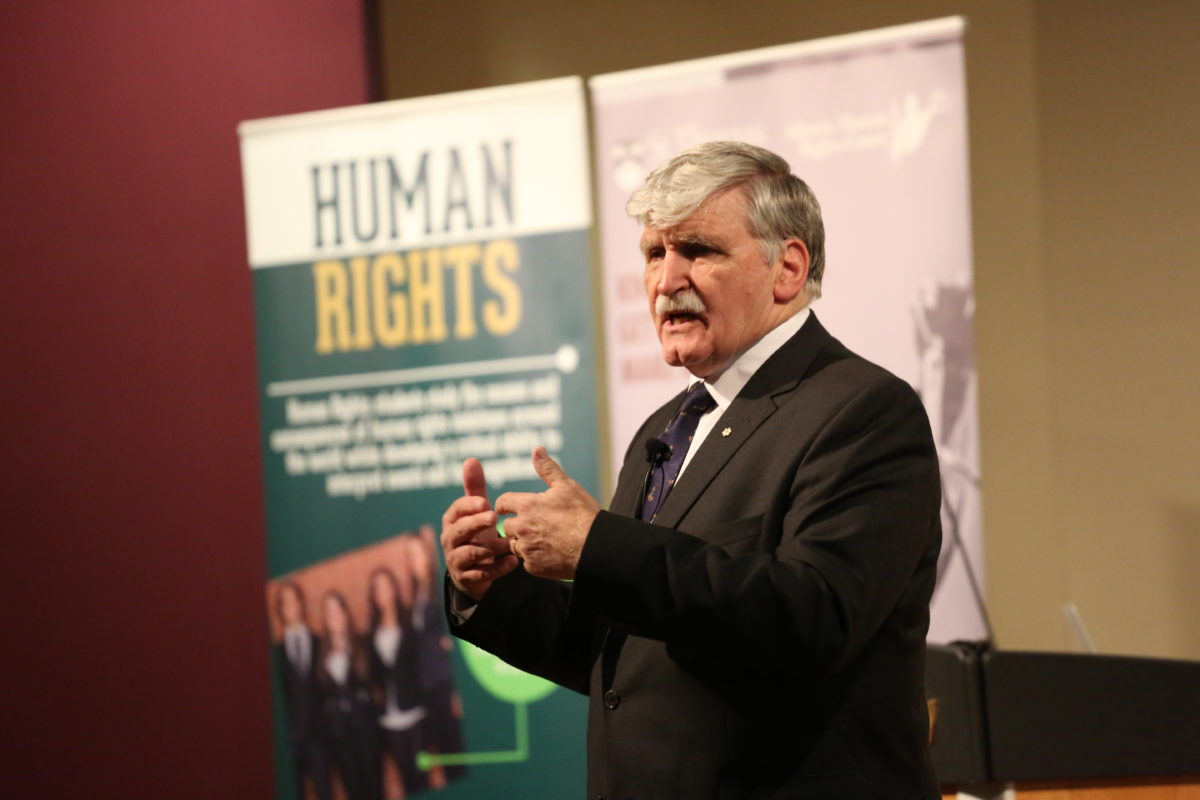
Roméo Dallaire says Canada’s young people are in position to make Canada a more “activist nation” that can help prevent atrocities and dislocation we’re now seeing across the Middle East and Africa.
“I believe that the generation without borders should establish a sort of right of passage from countries like ours that can take a leadership role because we have the capacity to do it,” the humanitarian and retired general told an overflowing audience in Kinsella Auditorium at St. Thomas University Thursday.
“Generation without borders” are people under 25 years of age. Dallaire said social media have made borders irrelevant for communication and the exchange of ideas for millennials. This generation needs to travel the world, join NGOs and help shape Canada’s future foreign policy, he said.
In the Lodhi Memorial Lecture in human rights, Dallaire drew on his experience in leading humanitarian missions during the Rwandan genocide in the late 1990s. He peppered his lecture with stories of starving, diseased people, a young boy living with dead parents and abused women.
He pointed out parallels between what happened in Rwanda and the current Syrian refugee crisis. He said both crises were a result of failure by the international community to protect vulnerable people.
Dallaire said middle countries like Canada and Brazil would be the ideal powers to step in for humanitarian missions, which he emphasized often means “boots on the ground…
“When you do send the Americans – or the big boys – they do project that sense of occupation, of taking over,” he said. “We don’t carry the baggage of the big boys. We don’t carry the baggage of wanting to establish self interest… We actually believe in humanity.”
He also pointed out that intervening to protect people would be in Canada’s “self interest.” He said the terrible conditions and the internal conflicts that occur in refugee camps is the perfect breeding ground for extremism.
“We have been sitting on our asses too long,” he said near the end of the lecture. He urged students in the audience to experience what 80 per cent of the world is experiencing.
“Go and see the reality of that humanity and come back after having touched, smelled, and heard, and tasted and felt as human beings, what they’re going through. And influence this great nation to become an activist nation. You have the capabilities of doing that.”
The overflow crowd spilled outside the Kinsella where people sat in chairs and the floor, straining to hear what the retired general and a former Canadian senator had to say through the open auditorium doors. Jeffrey Carleton, director of communications for St. Thomas University, said there were between 430 and 450 people in attendance.
The estimated 25 people in the foyer had to listen to the lecture through open doors. According to Carleton, it was not possible to live stream or record any audio or video of the lecture because of rules set by the speaker’s bureau which Dallaire was booked through.
“It would be nice to accommodate everybody, but when you start to look at booking other venues to accommodate, then you start running into a cost situation as well,” said Carleton.
This event was the second human rights lecture at St. Thomas this year, thesecretary-general of Amnesty InternationalAlex Neve, which also attracted an overflowing audience.
